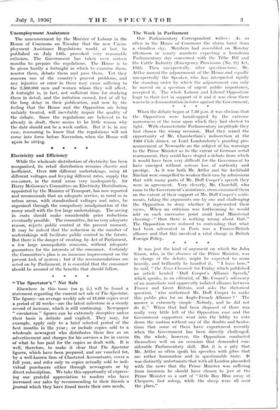When the debate began at 7.30 p.m. it was obvious
that the Opposition were handicapped by the extreme narrowness of the issue upon which they had elected to fight. With characteristic Parliamentary ineptitude they had chosen the wrong occasion. Had they seized the opportunity of Mr. Chamberlain's indiscretion at the 1900 Club dinner, or Lord Londonderry's puzzling pro- nouncement at Newcastle on the subject of his warnings to the Prime Minister as to the extent of German aerial rearmament, they could have staged a debate from which it would have been very difficult for the Government to have emerged without serious loss of authority and prestige. As it was both Mr. Attlee and Sir Archibald Sinclair were compelled to weaken their case by admissions that with many parts of Mr. Duff Cooper's speech they were in agreement. Very cleverly, Mr. Churchill, who came to the Government's assistance, cross-examined them on the extent of their support of Mr. Duff Cooper's senti- ments, taking the arguments one by one and challenging the Opposition to deny whether it represented their views. When no criticism was forthcoming he would add on each successive point amid loud Ministerial cheering—" then there is nothing wrong about that." The Opposition were reduced to contending that what had been advocated in Paris was a Franco-British alliance and that this involved a vital change in British Foreign Policy. * *














































 Previous page
Previous page